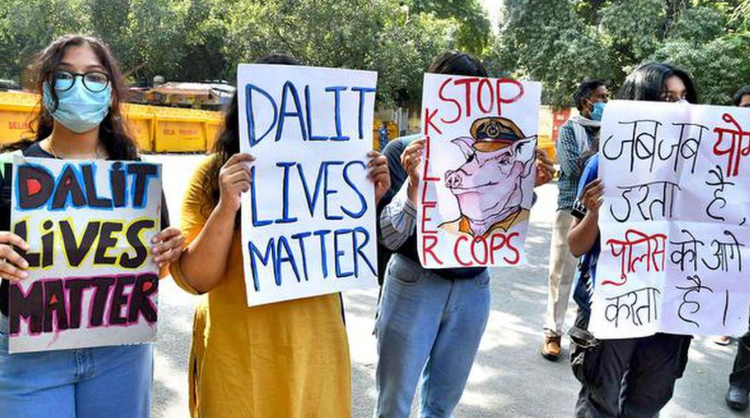Report on Atrocities Against Scheduled Castes and Scheduled Tribes (GS Paper 1, Society)

Introduction
- The recent report released by the Union Government under the Scheduled Castes and Scheduled Tribes (Prevention of Atrocities) Act, 1989, sheds light on the alarming status of atrocities against Scheduled Castes (SCs) and Scheduled Tribes (STs) in 2022.
- This report emphasizes the ongoing challenges these communities face and underscores the need for robust measures to ensure their protection and justice.
Key Findings of the Report
Case Statistics
- Scheduled Castes (SCs): In 2022, there were 51,656 cases of atrocities against SCs.
- Scheduled Tribes (STs): There were 9,735 cases against STs.
- A staggering 97.7% of SC cases and 98.91% of ST cases were concentrated in just 13 states.
States with Highest Incidents
- For SCs:
- Uttar Pradesh: 12,287 cases (23.78%)
- Rajasthan: 8,651 cases (16.75%)
- Madhya Pradesh: 7,732 cases (14.97%)
- Other significant states include Bihar (6,799 cases), Odisha (3,576 cases), and Maharashtra (2,706 cases).
- For STs:
- Madhya Pradesh: 2,979 cases (30.61%)
- Rajasthan: 2,498 cases (25.66%)
- Odisha: 773 cases, with Maharashtra (691 cases) and Andhra Pradesh (499 cases) also notable.
Charge Sheets and Investigations
- SC-related Cases: Charge sheets were filed in 60.38% of cases; 14.78% concluded without further action due to reasons such as false claims.
- ST-related Cases: Charge sheets were filed in 63.32% of cases, with 14.71% ending without action.
- As of the end of 2022, 17,166 SC cases and 2,702 ST cases were still under investigation.
Conviction Rates
The conviction rate under the SC/ST Act has decreased from 39.2% in 2020 to 32.4% in 2022, indicating troubling judicial outcomes.
Infrastructure Deficiencies
- Only 194 out of 498 districts in 14 states have established special courts to expedite trials.
- Notably, Uttar Pradesh, with the highest cases, has no identified atrocity-prone areas.
Protection Cells
- Protection cells for SC/ST communities have been set up in various states and union territories, including Andhra Pradesh, Bihar, and Tamil Nadu.
Reasons for Crimes Against SC and ST Communities
- Caste Prejudice and Untouchability: Deep-rooted societal norms perpetuate discrimination against SC/ST communities.
- Land Disputes: Historical alienation from land ownership leads to conflict over land rights.
- Economic Marginalization: Limited access to education and employment exacerbates vulnerability.
- Social and Political Power Imbalance: Dominant castes often exploit their power without facing repercussions.
- Inadequate Implementation of Laws: Weak enforcement and bureaucratic bias hinder justice.
- Political Opportunism: Caste tensions can be exploited by political actors for electoral gain.
The Scheduled Castes and Scheduled Tribes (Prevention of Atrocities) Act, 1989
Overview
- The Act was enacted to protect SCs and STs from violence and discrimination, addressing shortcomings of earlier legislation.
Key Provisions
- Offences: It categorizes various acts against SC/ST members as atrocities and prescribes stringent punishments.
- Special Courts: Mandates the establishment of special courts for expedited trials.
- Anticipatory Bail Provisions: Excludes anticipatory bail for accused under this Act, ensuring swift action against offenders.
- Investigations: Requires that investigations be conducted by officers of a specific rank and completed within a stipulated timeframe.
Recent Amendments
- 2015 Amendment: Expanded definitions of offences and included additional protections for SC/ST women.
- 2018 Amendment: Removed prior approval requirements for arrests, allowing immediate action.
Judicial Precedents
- Several landmark cases have shaped the interpretation and enforcement of the Act, clarifying its application and the rights of SC/ST individuals.
Way Forward
- Strengthening Legal Framework: Enhance infrastructure for special courts and train law enforcement to handle cases sensitively.
- Improving Reporting Mechanisms: Develop systems for victims to report incidents safely.
- Awareness and Education: Implement campaigns to educate communities about their rights and legal protections.
- Targeted Interventions: Identify atrocity-prone districts for focused action against caste-based violence.
- Monitoring and Evaluation: Establish a framework to assess the effectiveness of protective measures.
- Collaboration with NGOs: Partner with civil society to support victims and advocate for their rights.
Conclusion
- The report highlights the persistent challenges faced by SCs and STs in India.
- It underscores the need for stronger legal measures, better implementation of existing laws, and a concerted effort to change societal attitudes toward caste-based discrimination.
- Only through comprehensive and sustained action can we hope to reduce atrocities and promote justice and equality for these marginalized communities.


